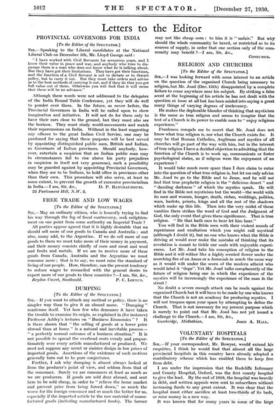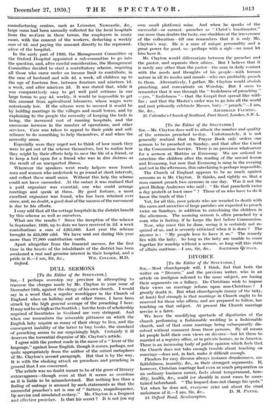VOLUNTARY HOSPITALS
[To the Editor of the SPECTATOR.] Sta,—If your correspondent, Mr. Bowyer, would extend his enquiries, I think he would find that almost all the large provincial hospitals in this country have already adopted a contributory scheme which has enabled them td keep free from debt.
I am under the impression that the Radcliffe Infirmary and County Hospital, Oxford, was the first county hospital to give the lead. By the end of 1919, the hospithl was heavily in debt, and written appeals were sent to subscribers without increasing funds to any great extent. It was clear that the hospital Must either sacrifice at least two-thirds of its beds, or raise money in a new way.
It was known that for many years in some of the ldrge
manufacturing centres, such as Leicester, Newcastle, &c., large sums had been annually collected for the local hospitals from the workers in those towns, the employers in many cases, with the .consent of the workers, deducting a weekly sum of 4d. and paying the amount directly to the represent- ative of the hospital.
In the early part of 1920, the Management Committee of the Oxford Hospital appointed a sub-committee to go into the question, and, after careful consideration, the Management Committee decided to start a contributory scheme, requiring all those who came under an income limit to contribute, in the case of husband and wife 4d. a week, all children up to the age of fourteen free, between fourteen and nineteen Id. a week, and after nineteen 2d. It was stated that, while it was comparatively easy to get well paid artizans in our large towns to pay 4d. weekly, it would be impossible to get this amount from agricultural labourers, whose wages were notoriously low. If the scheme were to succeed it would be by holding meetings in the villages and small towns, and by explaining to the people the necessity of keeping the beds in being, the increased cost of running hospitals, and the enormous increase in the number of operations, and other services. Care was taken to appeal to their pride and self- reliance to do something to help themselves, if and when the necessity arose.
Especially were they urged not to think of how much they were to get out of the scheme themselves, but to realize how they might by their efforts help to save the life of a friend, or to keep a bed open for a friend who was in dire distress as the result of an unexpected illness.
Wherever the speakers went ready helpers were found, men and women who undertook to go round at short intervals, and collect these small sums. Without this help the scheme could not have succeeded. At the outset it was realized that a paid organizer was essential, one who could arrange meetings and speak at them. By good fortune, a most excellent organizer was found, who has been retained ever since, and, no doubt, a good deal of the success of the movement is due to his efforts.
I may add that all the cottage hospitals in the district benefit by this scheme as well as ourselves.
What are the results ? Since the inception of the scheme in September, 1920, up to date we have received in 2d. a week contributions a sum of £265,000. Last year the scheme brought in £33,000 odd. We have sent out during this year more than 77,000 contribution cards.
Apart altogether from the financial success, for the first time in the hearts of the inhabitants of the district has been awakened a real and genuine interest in their hospital, and a



































 Previous page
Previous page